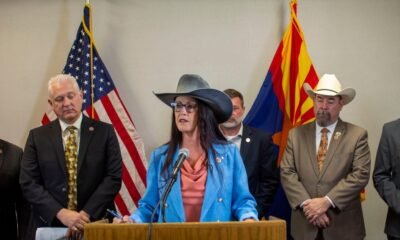Education
Lawmakers Push to Revitalize Teacher Funding Before Session Ends

In a significant development regarding education funding in Arizona, Sen. J.D. Mesnard, R-Chandler, has indicated that stakeholders are nearing agreement on Proposition 123, which aims to enhance teacher salaries through state land trust funding.
Mesnard expressed optimism about finalizing a comprehensive package in the coming weeks. This package would clarify details about the distribution rate, timeline, and funding goals of the initiative, marking a step towards consensus among legislators. However, challenges remain, particularly regarding Republican efforts to integrate school choice protections into the proposal. The exact framework of these provisions is still being debated and may face opposition from Democrats and the governor.
Despite the road ahead, both Mesnard and Governor Katie Hobbs are hopeful that a revised measure will gain traction this legislative session, eyeing a potential election in either November 2025 or 2026. Mesnard emphasized the importance of a package appealing to voters, highlighting the significance of prioritizing teacher pay amid a perceived crisis within the profession. He also acknowledged the need for parents to retain educational choices that best suit their families.
Proposition 123 is poised to expire at the end of the fiscal year, prompting the Legislature to backfill approximately $300 million to offset lost funds, thereby opening opportunities to rethink a vital funding source. Republican lawmakers continue to advocate for the reallocation of these funds specifically for teacher salary increases.
In February, Mesnard partnered with Rep. Matt Gress, R-Phoenix, to introduce legislation extending a 6.9% draw from the state land trust, proposing approximately $4,000 raises for eligible teachers. Eligible educators include those with strong performance evaluations, with different criteria for special education teachers. This Republican plan would also face expiration in ten years, raising concerns among stakeholders about the risks of fiscal cliffs tied to such a timeline.
Early plans from Governor Hobbs suggested a permanent 5.5% distribution rate, incorporating a 2.5% allocation into basic state aid alongside a 3% increase for the Classroom Site Fund. This would ensure a persistent rise in teacher salaries, with an additional proposal for a 10-year distribution of 1.4% aimed at bolstering base funding.
Mesnard noted that discussions are gaining ground on a teacher-centric plan, with stakeholders appearing supportive of the 6.9% distribution while exploring a more hybrid approach potentially involving a permanent 4.5% allocation.
Current dialogues among lawmakers are ongoing, with active drafting of legislative language. Mesnard confirmed that he and Gress aim to present mirror amendments once the proposal is finalized, with a deadline approaching as sine die nears.
The timing of a special election remains uncertain, although Hobbs is advocating for a November 2025 date for the ballot. She expressed hopes that progress can be achieved this year, stressing the importance of getting the proposal to voters soon.
If a November election is pursued, the Secretary of State’s Office has suggested that counties require a six-month preparation period. Alternatively, the measure could also be slated for the 2026 midterm elections. Regardless of the timeline, Mesnard conveyed confidence in passing meaningful legislation this session. “We’re all working towards that,” he affirmed.


















